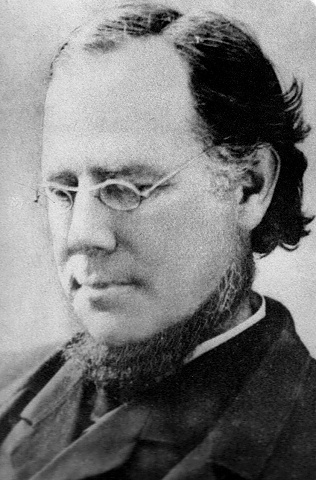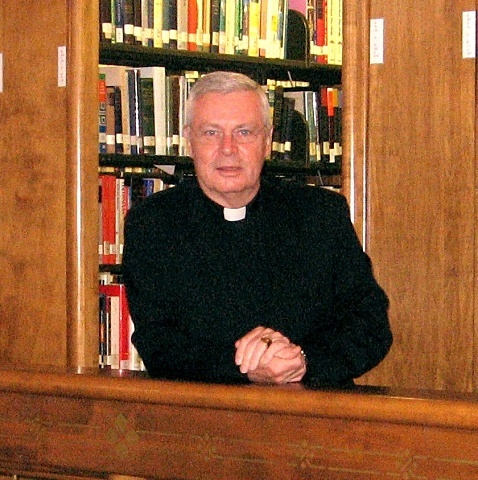September 10, 2012
This is the twentieth in a series of previously unpublished reflections from the 1854 spiritual notebook of Paulist Founder, Servant of God Father Isaac T. Hecker. The reflection series is being made pubic in conjunction with Father Hecker’s cause for canonization. Father Paul Robichaud, CSP, Paulist historian and postulator for Father Hecker’s cause for sainthood, offers a response to Father Hecker’s reflection.

The difference between meditation and contemplation is that between someone on a strange road who has to feel his way in the dark and another who walks the same road at midday. Acquired contemplation is where after a good deal of work and difficulty one draws away from other things in meditation, in order to gaze upon and love (God). Infused contemplation is where after reading or thinking or meditating upon some object of revelation, without any labor or trouble, one throws off all thought of other things and is raised up by God. We live and move and have our being in God; and this explains how at times spiritual acts are inexplicit or as unconscious as the breath we exhale.
One can become holy in the contemplative life without the active, but one cannot become holy in the active life without the contemplative. In Luke 10:42, (the story of Mary and Martha) Mary not only chose the better part but also the part that “should never be taken from her.” Why? Because contemplation is the beginning of the Beatific Vision; and contemplative life is a participation in the life of the Blessed (in heaven). For we behold God with the same light and love him with the same love in contemplation, only to a lesser degree as the Blessed in heaven. Mary not only chose the “better part” but also the part that never “should be taken from her.”
It cannot be said that the purely contemplative life is a more perfect state for us today. When our Blessed Lord said that Mary had chosen the better part; He meant that if either had to be chosen exclusively, the better part was that of Mary. But the life which holds the highest rank is that which consists of contemplation and preaching, which we called “mixed.” St. Thomas (Aquinas) says it is greater to enlighten others than to be enlightened ourselves, and preaching arises out of the plenitude of contemplation. St. Thomas ranks life as follows: 1. The mixed life, 2. The contemplative life and 3. The active life.

Holiness comes from union with God. We seek to be with God and as Christians we believe that this is possible because God has come to us in Jesus Christ. In meditation we seek union with God; but it is something we have to work at through our thought, reading or prayer. In contemplation we no longer have to work or struggle, we have found God and can enjoy being in God’s holy presence.
Father Hecker illustrates this point with the story of Mary and Martha from the Gospel of Luke. Martha is struggling. She is doing a religious task, welcoming Jesus into her home, and she asks Mary to help her. Mary however is in contemplation, notes Father Hecker. She is enjoying the presence of God in Jesus. She has the “better part.” As Father Hecker tells us, in contemplation, “we behold God with the same light, and love him with the same love in contemplation, only to a lesser degree as the Blessed in heaven.” Through the resurrection, not only will we live forever but we will be in the very presence of God. Contemplation then, is a foretaste of what awaits us in heaven and it should never be taken away.
The awareness of God’s presence in our lives deepens our faith. It becomes a cycle; our awareness deepens our faith and our faith deepens our awareness. Therefore contemplation is necessary for a life of holiness. But contemplation is not enough for a modern Christian. Father Hecker was an amazing blend of contemplative prayer and pastoral action. Rather than seeing action as the opposite of contemplation, Hecker believed that like himself, modern Christians needed to live a mixed life; one of contemplation and action or what he called in this text, contemplation and preaching. He quotes St. Thomas, “that it is greater to enlighten others than to be enlightened ourselves.” Here is the challenge of being a modern Christian, to be contemplative and active, letting our experience of God’s presence not only deepen our faith but increase our witness and behavior as well.
About Father Isaac Hecker’s 1854 Spiritual Notebook:
Servant of God, Father Isaac Hecker wrote these spiritual notes as a young Redemptorist priest about 1854 and they have never been published. Hecker was 34 years old at the time, and had been ordained a priest for five years. He loved his work as a Catholic evangelist. The Redemptorist mission band had expanded out of the New York state area to the south and west, and the band’s national reputation grew. Hecker had begun to focus his attention on Protestants who came out to hear them. To this purpose Hecker began to write in 1854 his invitation to Protestant America to consider the Catholic Church, “Questions of the Soul” which would make him a national figure in the American church.
Hecker collected and organized these notes that include writings and stories from St. Alphonsus Liguori, the Jesuit spiritual writer Louis Lallemant and his disciple Jean Surin, the German mystic John Tauler, St. Thomas Aquinas and St. Jane de Chantal among others. These notes were a resource for retreat work and spiritual direction and show Hecker’s growing proficiency in traditional Catholic spirituality some ten years after his conversion to the Catholic faith. They are composed of short thematic reflections.